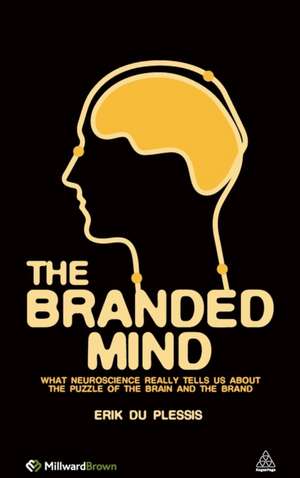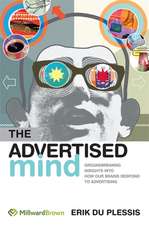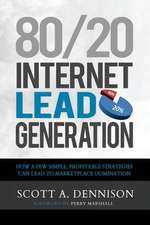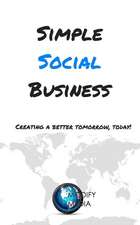The Branded Mind – What Neuroscience Really Tells Us About the Puzzle of the Brain and the Brand
Autor Erik Du Plessisen Limba Engleză Hardback – 2 feb 2011
The Branded Mind is about how people think, and in particular how people think about brands. Brand choice decisions ultimately take place inside the consumer's head. Neuroscience, then, holds lessons for how consumers respond to brands and make purchasing decisions. Marketers and brand managers should take note.
Erik du Plessis does just that. In this, his second book, du Plessis explores what scientists have uncovered about the structure of the brain and how different parts of the brain interact. He investigates developments in neuroscience and neuromarketing and what lessons this holds for brand managers. What bearing do these developments have on current theories of consumer behavior? How can neuroscience contribute to marketing and brand-building strategies?
Including research by Millward Brown, The Branded Mind touches on key topics such as the nature of feelings, moods, personality, measuring the brain, consumer behavior, decision making, and market segmentation.
Preț: 294.19 lei
Nou
Puncte Express: 441
Preț estimativ în valută:
56.30€ • 58.56$ • 46.48£
56.30€ • 58.56$ • 46.48£
Carte tipărită la comandă
Livrare economică 12-26 aprilie
Preluare comenzi: 021 569.72.76
Specificații
ISBN-13: 9780749461256
ISBN-10: 074946125X
Pagini: 272
Dimensiuni: 156 x 234 x 18 mm
Greutate: 0.6 kg
Editura: Kogan Page
ISBN-10: 074946125X
Pagini: 272
Dimensiuni: 156 x 234 x 18 mm
Greutate: 0.6 kg
Editura: Kogan Page
Cuprins
Foreword by Nigel Hollis
About the author and contributors
Acknowledgements
Part One: What it is all about
01 Introduction
The meta- and the micro-problem
Over-claiming
Emotions and feelings
Where does this leave us?
The puzzle
02 This book is about the consumer's brain
Why I wrote this book
Why do we make decisions?
How do people differ from animals on this view?
How does this happen in the brain?
How do we buy a brand?
Marketing practice
So what is this book all about?
03 The new paradigm
From Descartes to Damasio
Who is Damasio?
Who was Descartes?
What is the paradigm shift that we are looking at?
Damasio's somatic marker theorem
04 The brain - the coming together of disciplines
Part Two: The decision-making puzzle
05 Interpretation, memory, experience, learning
Why the memory system is important
Feeling good, culture, personality and memories
The brain
Gestalts
What do artificial neural networks do very well?
Marketing implications of classifying and predicting
Interpretation, memory recall, 'comes to mind'
06 Introducing the rat brain robot
Let's look at this robot rat
What brain systems does the robot rat need to be more like a human (or just more like a fruit fly)?
'Movere' is Latin for 'to move', 'to be motivated'
Move! But where to?
07 Feelings
Why we need to understand feelings
From many gestalts to one: attention and touchpoints
Everybody knows what feelings, emotions, and moods are-do the scientists?
Does it matter?
Definition used in this book
Time
The limbic system: the oldest part of the brain
08 The 'feeling' brain systems and how they work
Reconciling this view with Damasio's view
09 The environmental awareness system: emotions
An emotion is a post-rationalization
Rational or emotional?
But are advertisements like snakes?
Culture and the amygdala
Herd behaviour
How many emotions do we have?
Emotions and marketing
10 The 'state of body' system: homeostasis
Bio-measures and homeostasis
11 The 'state of mind' system, or moods and arousal
Why the brain needs to control its levels of arousal
Mood and time
We continuously control our moods
Bio-measures, mood and arousal
12 The evaluation system: pleasure
'Dopaminic memories' of brands
Bio-measures and dopamine
13 Personality
Human 'personality' variation
What is personality?
It is not survival of the fittest, but death to the unfit
Personality and time
What does this have to do with brands?
Marketing
About brand personality
Bio-measures and personality
14 Social systems and culture
The neuro-basis of culture
Why do we have an empathy circuit in the brain?
Prejudice
The marketing error resulting from the empathy system
Teaching feelings
What is culture?
Culture and time
Language
Oatley and Jenkins's view about culture and emotions
The global brand
Culture is much more than countries
Bio-measures and culture
15 Gender differences
The male/female brain
16 Let's put it all together
So how do we think we think?
'Thinking' involves a lot of brain process
Making a choice
A 'new' thought
Feelings and time
17 Measuring the brain
Single-cell measurement
Electroencephalography (EEG)
Magnetocencephalography (MEG)
Transcranial magnetic stimulation (TMS)
Indirect measures of neural activity
Very indirect measurements of brain activity
'Reading' the measures
Creativity in designing brain scanning experiments
18 Increasing our brainpower - using neuroscience effectively by Graham Page
The current state of play
Key questions to ask
Implicit association measurement
Eye-tracking
Brainwave measurement
Will neuroscience replace conventional research?
The future: integration
When should neuroscience-based techniques be used?
Getting the best out of neuroscience
Part Three: Creating mischief
19 On creating mischief
The Hidden Persuaders
'The seductive allure of neuroscience explanations'
The buy button
Sensationalism will increase
20 Buy-ology
My view
21 The elusive subconscious
The big subconscious
The subconscious and religion
The confusion that arises when people willy-nilly talk about the subconsciousness
This is a personal belief
A justification for brain scanning projects?
What Freud said
Respondents lying and our ethics
Part Four: Towards insights
22 Read Montague's Pepsi Challenge
About Read Montague
The contribution of other sciences
Montague on culture
23 Science: models and measurements
The homunculus
Decision making
Models and measurements
Models: the future
Part Five: Some marketing implications
The marketing implications I chose
The build-up of the next five chapters
24 Attention
Why it is an important topic
The issue
Studying an exam or giving attention to an advertisement
Death of the 30-second ad?
Some empirical data
Why is this in a book about neuromarketing?
Inadvertent attention
The response curve and re-cognition
Re-cognition in non-fast-forwarded advertisements
Media strategy implications
Neuroscience and re-cognition (or repeat exposure)
Why repeat exposures to an advertisement?
But why does the level of awareness matter?
Can an advertisement have an effect without it being given attention?
The advertising effect of this
Du Plessis's error
Conclusions
25 The brand soma
What I mean by the brand soma
The brand soma and functionality
Neurology
What does the brand soma do?
Brand soma, rationality and functionality
Fishbein and brand utility
How the brand soma works in practice
How this shows in perceptual maps
Revisiting Fishbein
The dopamine moment
'How would using the brand make you feel?'
Using the halo effect
26 Consumer decision making as heuristics
What is an heuristic?
Neuromarketing and heuristics
Feelings and heuristics
BrandDynamics
Different people have different heuristics in different situations
Heuristics and questionnaire design
Where does this lead us (marketers)?
27 Market segmentation
Good segmentation should not be like this
Some suggestions about segmentation studies
Neuromarketing and segmentation
Segmentation and neural studies-a chocolate example
28 Advertising budget, brand life cycle, synapses and brand soma
Setting the budget
Peter Field and AC Neilson
The dynamic difference model
Implications for 'percentage of revenue' budget
This is a big ask of the brand
Brand life cycles
Jones's advertising intensity curve
Brand life cycle: a self-fulfilling belief?
Optimizing advertising budgets
The changing pieces of the puzzle
Part Six: My conclusions
29 What this was all about
From very small things to very big things
30 Is the future what it was?
What the future will bring
Summary implications for neuromarketing
References
Index
Recenzii
"[T]he result of very considerable thought, but thought that has been influenced by the author's digestion of a massive battery of empirical work, in addition to many examples from his long experience as an innovative market researcher." - John Philip Jones, Emeritus Professor at Syracuse University
"Du Plessis...provides an illuminating glimpse into the "black box" of consumer behavior...the author presents research findings to suggest that neuroscience has enough practical substance to warrant exploration of how it might help marketers design strategies that result in more individually tuned consumer value and satisfaction... Summing Up: Recommended." --Choice Magazine
"The Branded Mind...provides a fine survey of how neuroscience research affects market research techniques, and how it can learn from established business routines… explores recent studies and findings in both neuroscience and business, making this a pick for both types of college-level collections.” –Midwest Book Review
“…[The Branded Mind] will generously reward those who read it with great care… With both rigor and eloquence, [Erik Du Plessis] explains why emotions are not in conflict with rational behavior; indeed, they cause rational behavior. For those who are eager to understand the consumer brain and the decision-making process it tends to follow, this insight is of incalculable value… It is a brilliant achievement.” –Robert Morris
Recommended by CEO Refresher!
"... provides an in depth and contemporary analysis of how people think, and how that relates to branding...those in search of a rich and comprehensive understand of neuromarketing should look no further." -- brandchannel.com
See an excerpt on the American Educational Foundation website!
"...[A] fascinating ride into one of the last uncharted areas of the body... This book will be an incredibly useful and beneficial addition to the knowledge of the brain and how traders can exploit its functions." - -- Will Roney, Startup Business Book Reviews
"[T]he result of very considerable thought, but thought that has been influenced by the author's digestion of a massive battery of empirical work, in addition to many examples from his long experience as an innovative market researcher." - John Philip Jones, Emeritus Professor at Syracuse University "Du Plessis...provides an illuminating glimpse into the "black box" of consumer behavior...the author presents research findings to suggest that neuroscience has enough practical substance to warrant exploration of how it might help marketers design strategies that result in more individually tuned consumer value and satisfaction... Summing Up: Recommended." "--"Choice Magazine ""The Branded Mind."..provides a fine survey of how neuroscience research affects market research techniques, and how it can learn from established business routines... explores recent studies and findings in both neuroscience and business, making this a pick for both types of college-level collections." "-"Midwest Book Review ..".["The Branded Mind"] will generously reward those who read it with great care... With both rigor and eloquence, [Erik Du Plessis] explains why emotions are not in conflict with rational behavior; indeed, they cause rational behavior. For those who are eager to understand the consumer brain and the decision-making process it tends to follow, this insight is of incalculable value... It is a brilliant achievement." -Robert Morris Recommended by CEO Refresher! ..". provides an in depth and contemporary analysis of how people think, and how that relates to branding...those in search of a rich and comprehensive understand of neuromarketing should look no further." -- brandchannel.com See an excerpt on the American Educational Foundation website! ..".[A] fascinating ride into one of the last uncharted areas of the body... This book will be an incredibly useful and beneficial addition to the knowledge of the brain and how t
Notă biografică
Erik du Plessis is President of the Johannesburg-based research agency, Impact Information. Impact is now part of the Millward Brown Group, one of the world’s top 10 market research companies (owned by WPP) with 65 offices in 39 countries. He is also the author of The Advertised Mind.
Descriere
"The Branded Mind" is about how people think about brands. It explores what we know about the structure of the brain and how different parts of the brain interact. Then it goes on to explain how this relates to current marketing theories on consumer behavior.



















